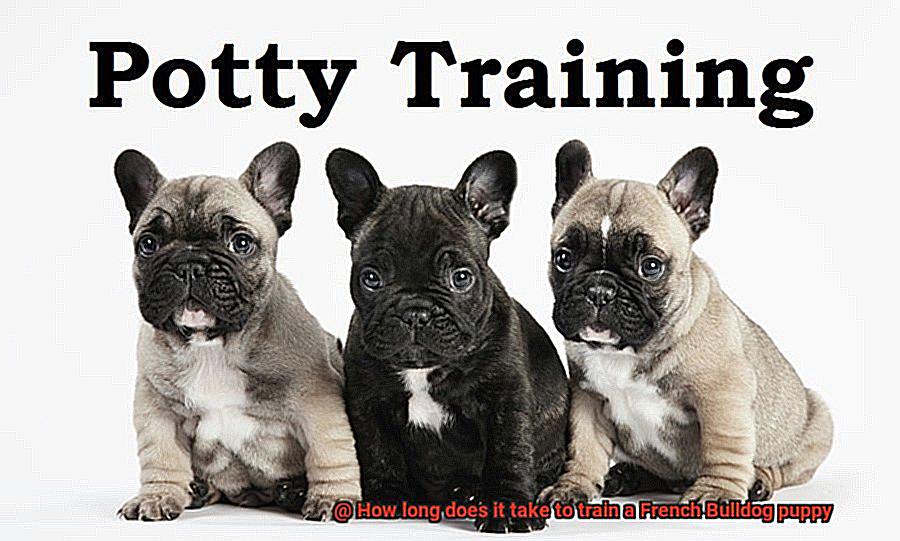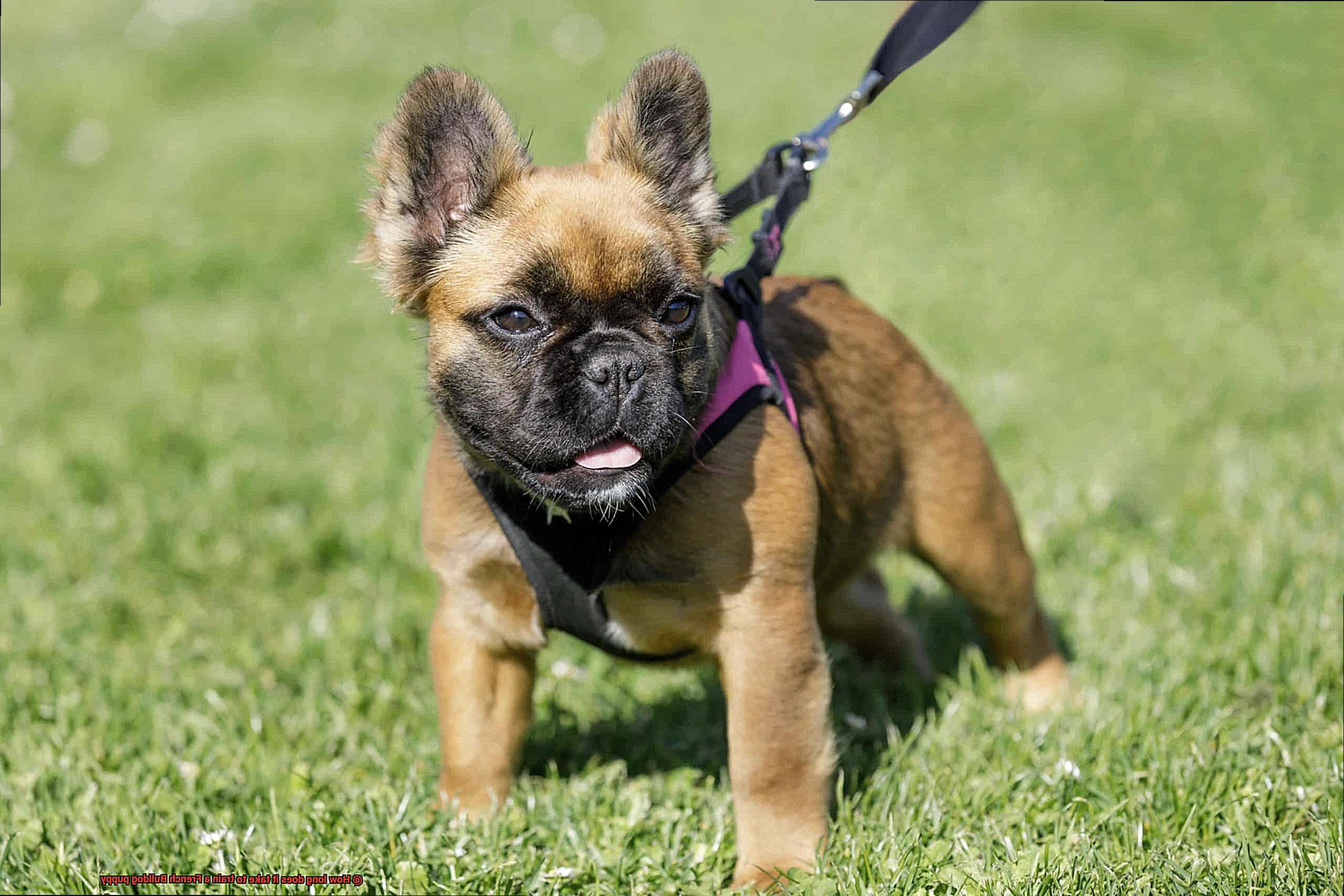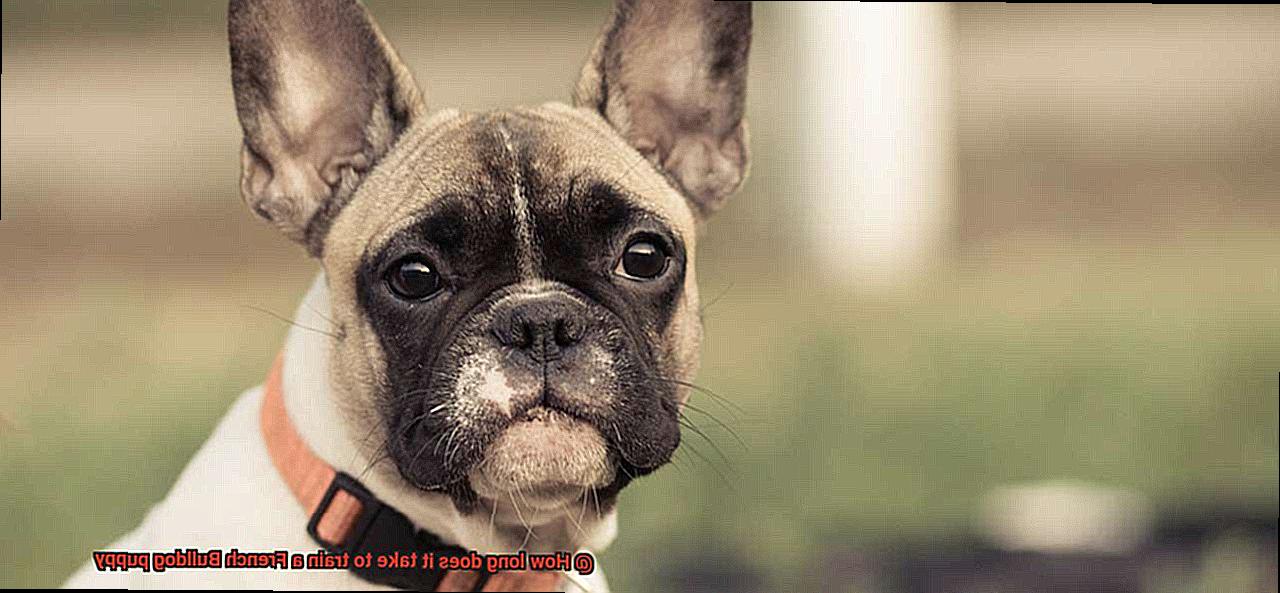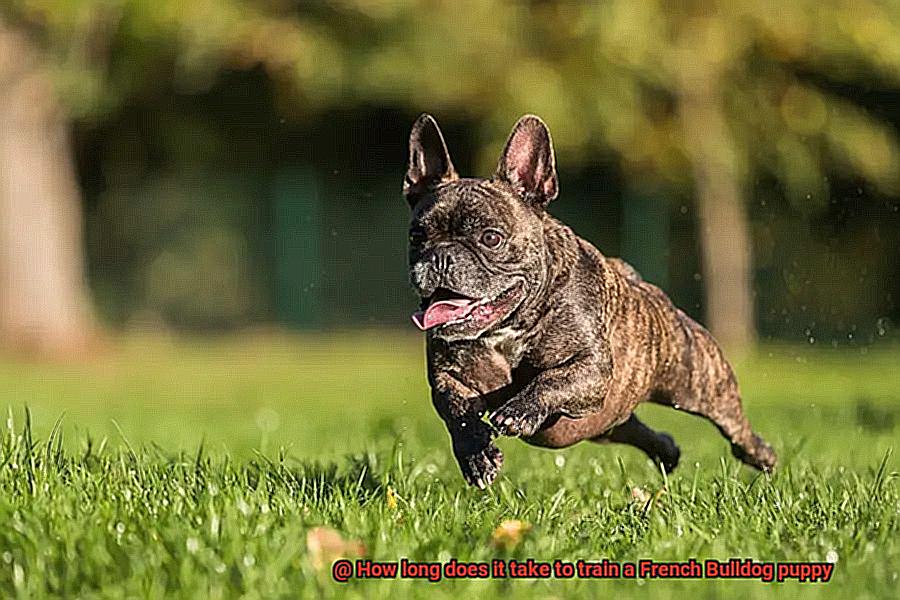How long does it take to train a French Bulldog puppy?
Got a mischievous and oh-so-adorable French Bulldog pup? Get ready for a wild ride filled with love, laughter, and loads of training sessions. Training your French Bulldog isn’t just about building a strong bond – it’s about creating the ultimate well-behaved sidekick.
Newbie or seasoned pro, training a French Bulldog comes with its own unique thrills and spills. From basic commands to socializing and potty training, we’ve got it all covered. So, let’s dive headfirst into the world of French Bulldog training and find out just how long it takes to transform that playful ball of energy into the most paw-some member of your family.
In this blog series, we’ll explore every nook and cranny of training your Frenchie pup. With expert insights and practical tips at your fingertips, you’ll be navigating this delightful journey like a pro in no time. So grab some treats, get comfy, and let’s unlock the secrets to raising an adoring and well-trained French Bulldog.

Factors That Affect Training Timelines
Contents
- 1 Factors That Affect Training Timelines
- 2 Establishing Good Habits in the First Few Months
- 3 The Benefits of Positive Reinforcement
- 4 Understanding Each Puppy’s Unique Learning Pace
- 5 Tips for Training a French Bulldog Puppy
- 6 Socialization is Key for a Well-Rounded Dog
- 7 Continuing Reinforcement for Long-Term Success
- 8 Common Mistakes to Avoid When Training
- 9 Conclusion
Training a French Bulldog puppy can be an exciting yet challenging journey. The time it takes to train these adorable pups can vary depending on various factors. In this blog post, we will explore the key factors that influence the timeline of training a French Bulldog puppy, providing you with valuable insights to make the process smoother and more efficient.
Breed Characteristics:
French Bulldogs are intelligent and eager to please, making them relatively easy to train compared to other breeds. However, their stubborn streaks can sometimes prolong the training process. Understanding their specific traits and adapting the training methods accordingly can help expedite the timeline.
Age of the Puppy:
Early training is crucial for French Bulldog puppies. Starting between 8 and 12 weeks of age is ideal, as they are most receptive to learning during this period. Delaying training until they are older may result in a longer timeline, as they might have already developed certain habits that need correction.
Consistency and Persistence:
Consistency and persistence are vital for successful training. Regular training sessions, preferably daily, help reinforce desired behaviors and establish a routine. Short but frequent sessions work better than infrequent longer ones. Using consistent commands and rewards helps your puppy understand expectations.
Training Methods and Techniques:
Positive reinforcement-based methods, such as using treats or praise, work best for French Bulldogs. Harsh or punishment-based methods can cause fear or anxiety, hindering progress. Tailoring the approach to your puppy’s temperament and learning style can accelerate the training process.
Socialization:
Socialization is essential for French Bulldog puppies to develop confidence and adaptability. Introduce them to various people, animals, environments, and situations from an early age. Regular socialization activities like puppy classes or playdates ensure proper development and facilitate a smoother training process.
Individual Factors:
Each French Bulldog puppy is unique, and individual factors like previous experiences, personality, health, and environment can influence their training timeline. Adapt your training approach to suit their needs and be flexible in your expectations.
Conclusion:
Training a French Bulldog puppy requires understanding their breed characteristics, starting early, being consistent and persistent, using positive reinforcement-based methods, prioritizing socialization, and considering individual factors. By incorporating these factors into your training routine, you can help your French Bulldog puppy become a well-behaved and obedient companion in no time. Remember, patience and dedication are key throughout the training process. Happy training.
Establishing Good Habits in the First Few Months
The first few months of a French Bulldog puppy’s life are crucial for setting them up for success in their training journey. During this time, they are like sponges, absorbing information and forming habits that will shape their behavior as they grow older. By focusing on establishing good habits early on, you can ensure that your French Bulldog puppy becomes a well-behaved and obedient companion. Here are some key habits to focus on during this important period:
- Basic obedience commands: Teaching your French Bulldog puppy basic obedience commands such as sit, stay, come, and walking on a leash is essential. These commands provide the foundation for more advanced training later on.
- Consistency is key: Establishing a routine and sticking to it will help your French Bulldog puppy understand what is expected of them. Consistency in training methods, schedules, and rules will prevent confusion and make the learning process smoother.
- Positive reinforcement: French Bulldogs respond well to positive reinforcement. Rewarding them with treats, praise, and affection when they exhibit desired behaviors will encourage them to repeat those behaviors. This positive approach creates a bond of trust between you and your puppy.
- House training: House training is an important aspect to focus on during the first few months. Crate training can be particularly helpful in teaching them where to go potty and preventing accidents inside the house.
- Setting boundaries: Teaching your French Bulldog puppy what is acceptable behavior and what is not is essential. Discourage biting, chewing on furniture or shoes, and jumping on people from an early age to prevent these habits from becoming ingrained.
- Socialization: Introducing your French Bulldog puppy to different environments, people, animals, and experiences will help them become well-rounded dogs. This early socialization will make them more confident and adaptable in various situations.
Remember, every puppy is different and will learn at their own pace. Some French Bulldogs may catch on quickly while others may take longer. Patience and consistency are key throughout the training process. Seeking professional help from a dog trainer or attending puppy training classes can also be beneficial in ensuring your French Bulldog puppy receives proper guidance and training.
The Benefits of Positive Reinforcement
Positive reinforcement helps to build a strong bond between you and your French Bulldog puppy. When you reward them with treats, praise, and affection for performing desired behaviors, they will associate training sessions with love and appreciation. This strengthens the relationship and creates a positive association with training, making your puppy eager and willing to learn.
Creating a Positive Learning Environment
Positive reinforcement promotes a positive learning environment for your French Bulldog puppy. By focusing on rewarding correct behaviors, you encourage your puppy to actively engage in the training process. They become eager to figure out what actions will earn them rewards, leading to increased attentiveness and receptiveness to learning new commands or tricks. This makes training sessions more enjoyable for both of you.
Gentle and Humane Training
Unlike punishment-based methods, positive reinforcement allows you to shape desired behaviors in a gentle and humane way. Punishment-based methods can be stressful and intimidating for puppies, causing fear or anxiety that hinders their learning process. Positive reinforcement creates a safe and supportive environment where the focus is on rewarding good behavior rather than punishing mistakes. This approach helps prevent behavioral issues and encourages a confident and well-adjusted French Bulldog.
Long-Lasting Effects
Positive reinforcement has long-lasting effects on the overall behavior of your French Bulldog puppy. By consistently rewarding desirable behaviors from an early age, such as sitting calmly or walking nicely on a leash, these behaviors become ingrained and second nature to your dog. This sets a solid foundation for ongoing training and ensures a well-behaved and obedient adult French Bulldog.
Understanding Each Puppy’s Unique Learning Pace
When it comes to training a French Bulldog puppy, it’s important to remember that every pup is unique and will have their own individual learning pace. Just like humans, dogs have different personalities, temperaments, and abilities, which can greatly influence how quickly they learn new commands and behaviors.
So, let’s dive into the factors that can affect a French Bulldog puppy’s learning pace and how you can tailor your training approach to suit their needs.
- Age: Age plays a significant role in a puppy’s ability to learn and retain information. Younger puppies may have shorter attention spans and may take longer to grasp new concepts compared to older ones. However, older puppies may have developed some bad habits or behaviors that need to be unlearned, which can prolong the training process. So, consider your puppy’s age when setting expectations for their learning pace.
- Previous experiences and socialization history: A French Bulldog puppy’s previous experiences and socialization history can greatly impact their learning pace. Puppies who have had positive experiences and exposure to various environments, people, and animals are more likely to be confident and receptive to training. On the other hand, puppies with limited socialization may require additional time and patience to adjust and learn new commands.
- Genetic predispositions: Genetic predispositions can also play a role in a French Bulldog puppy’s learning pace. Some breeds are naturally more intelligent and eager to please their owners, making them faster learners. However, it’s important to note that individual variations within the breed can still exist, so not all French Bulldogs will have the same learning abilities.
- Tailor your training methods: To ensure effective training, it’s crucial to tailor your methods to suit your puppy’s needs. Some puppies respond well to treats as rewards, while others may prefer praise or playtime. Observing your puppy’s preferences and adjusting your training techniques accordingly can greatly enhance their learning experience.
- Keep it short and fun: Training sessions should be kept short and fun, especially for younger puppies. Their attention spans are generally shorter, so breaking up training into multiple short sessions throughout the day can be more effective than one long session. This approach prevents them from becoming overwhelmed or bored, keeping their motivation and enthusiasm high.
Tips for Training a French Bulldog Puppy
Bringing home a French Bulldog puppy is an exciting adventure, but it also comes with the responsibility of proper training. Training a French Bulldog puppy requires patience, consistency, and positive reinforcement. In this blog post, we will explore some tips and tricks to help you successfully train your furry friend.

Start training early:
The saying “early bird catches the worm” holds true when it comes to training your French Bulldog puppy. Begin training as soon as you bring them home, preferably between 8 and 16 weeks of age. During this critical learning period, puppies are like sponges, ready to absorb knowledge and develop good habits.

Positive reinforcement is key:
French Bulldogs respond best to positive reinforcement techniques. Reward your puppy with treats, praise, or playtime when they exhibit desired behaviors. This will motivate them to repeat those behaviors in the future and make the training experience enjoyable for both of you.
Consistency is crucial:
Consistency is the secret ingredient to successful training. Use the same commands, gestures, and rewards consistently to avoid confusing your puppy. Consistency helps establish clear expectations and speeds up the learning process.
Keep it short and fun:
French Bulldogs have short attention spans, so make sure to keep training sessions short and engaging. Aim for multiple 10-15 minute sessions throughout the day. Incorporate games and rewards to make it a fun experience for your puppy. Remember, a happy puppy is a motivated learner.
Socialization is vital for all dogs, including French Bulldogs. Introduce your puppy to different people, animals, and environments from an early age. This will help them develop good social skills and reduce behavior problems in the future.
Seek professional help if needed:
If you find yourself struggling with training or facing specific challenges, don’t hesitate to seek professional help. A professional dog trainer can provide personalized guidance and training plans tailored to your puppy’s needs. They will also help you establish a strong bond with your puppy and ensure that training is a positive and rewarding experience.
Socialization is Key for a Well-Rounded Dog
If you’re lucky enough to have one of these lovable companions in your life, then you know just how important it is to ensure they grow up to be well-rounded and confident dogs. And that’s where socialization comes in.
What is socialization, you ask? Well, it’s the process of exposing your French Bulldog puppy to various people, animals, environments, and situations in a positive and controlled manner. It helps them develop the necessary skills to navigate the world with ease and confidence. Let’s dive deeper into why socialization is key for a well-rounded French Bulldog.
- The Critical Socialization Period: Just like humans, puppies have a critical period of development where they are most receptive to new experiences and learning. For French Bulldogs, this period is between 3 and 14 weeks of age. It’s during this time that they should be introduced to different types of people – adults, children, individuals wearing hats or glasses – to help them become comfortable and confident around diverse individuals.
- Exposure to Other Animals: French Bulldogs are social creatures, and it’s important to expose them to other animals from an early age. Introducing them to other dogs, cats, and even smaller animals like birds or rabbits helps them develop appropriate social behaviors and learn how to interact with different species.
- Various Environments and Situations: To ensure your French Bulldog feels at ease in different settings, gradually introduce them to various environments such as parks, busy streets, shopping centers, and car rides. This exposure helps them become accustomed to different sights, sounds, smells, and stimuli they may encounter as they grow older.
- Controlled Socialization Activities: Puppy classes or playdates with other well-behaved dogs can be great opportunities for your French Bulldog to learn appropriate play behaviors, body language cues, and communication skills. Plus, it’s a chance for them to make new furry friends.
- Positive Reinforcement: As with any type of training, positive reinforcement plays a significant role in socialization. Rewarding your French Bulldog puppy with treats, praise, or play when they exhibit desired behavior encourages them to repeat those behaviors in similar situations.

Remember, socialization is not just a one-time thing. It should continue throughout your French Bulldog’s life. Regular exposure to new experiences and environments helps prevent fearfulness or anxiety in unfamiliar situations.
So, grab that leash and embark on the exciting journey of socializing your French Bulldog puppy. With patience, consistency, and positive reinforcement, you’ll be well on your way to raising a well-rounded and confident canine companion.
Continuing Reinforcement for Long-Term Success
Consistency is Key: Don’t let training become a one-hit wonder.
Training your French Bulldog puppy is not a one-time event; it’s an ongoing process that requires consistent reinforcement for long-term success. Just like learning any new skill, repetition and consistency are key to ensuring that your Frenchie retains the information and behaves appropriately in different situations.
Positive Reinforcement: The treat that keeps on giving
One effective method of continuing reinforcement is positive reinforcement. This involves rewarding your puppy with treats, praise, or playtime whenever they exhibit the desired behavior. By associating good behavior with positive experiences, your Frenchie will be motivated to repeat those actions.
Clicker Training: A little ‘click’ goes a long way
Another popular technique for continuing reinforcement is clicker training. This involves using a small device that makes a distinct clicking sound to mark desired behaviors, followed by a reward. The sound of the click becomes a signal for your Frenchie that they have done something right, making it easier for them to understand and remember commands.
Patience and Persistence: Rome wasn’t built in a day
Training a French Bulldog puppy takes time, patience, and persistence. It’s important to remember that setbacks and challenges may arise along the way. Your puppy may forget commands or exhibit unwanted behaviors at times. Stay calm, be consistent with your training methods, and continue reinforcing the desired behaviors.

Effective Implementation: Tips from the trenches
To effectively implement continuing reinforcement techniques, consider the following tips:
- Set clear goals and be realistic about what your Frenchie can achieve.
- Make training sessions short and frequent, as puppies have short attention spans.
- Use high-value rewards or treats to keep your Frenchie motivated.
- Be clear and consistent with your commands and cues.
- Gradually increase distractions and difficulty levels as your Frenchie progresses.
- Real-life Success Stories: Tales from the French Bulldog training trenches

Let’s hear from real French Bulldog owners who have achieved long-term success through continuing reinforcement. Jennifer, a proud Frenchie parent, shares her experience: “Consistency and positive reinforcement were the game-changers for us. Our Frenchie, Max, is now a well-behaved and happy pup.”
Common Mistakes to Avoid When Training
Training a French Bulldog puppy can be a rewarding experience, but it’s important to avoid common mistakes that can hinder their progress. Here are some key mistakes to steer clear of when training your furry friend:
- Inconsistency in training: Establish a routine and stick to it. Regular training sessions and consistent practice of commands and behaviors will help your puppy learn more effectively.
- Punishment-based training: Instead of using punishment, focus on positive reinforcement. Reward good behavior with treats, praise, and affection. This will motivate your puppy and strengthen their understanding of desired behaviors.
- Over-training: While consistency is important, over-training can lead to burnout and frustration. Keep training sessions short and enjoyable, and provide plenty of playtime and mental stimulation outside of training.
- Neglecting socialization: French Bulldogs are social animals and need exposure to different people, animals, and environments from a young age. Proper socialization helps prevent fearfulness and aggression later in life.
- Not seeking professional help when needed: If you’re struggling with training or if your puppy has specific behavioral issues, don’t hesitate to seek professional assistance from a dog trainer or behaviorist.
By avoiding these common mistakes, you’ll create a positive and successful training experience for your French Bulldog puppy. Remember to be patient, consistent, and always use positive reinforcement. With the right approach, you’ll have a well-trained and well-behaved furry companion for life.
2PgMc75rv5U” >
Conclusion
Training a French Bulldog puppy requires time, patience, and consistency.
While every dog is unique and learns at their own pace, it typically takes several months to fully train a French Bulldog puppy. The key is to start early and establish a strong foundation of obedience commands such as sit, stay, come, and leave it.
Consistent daily training sessions are essential to reinforce these commands and teach your puppy good manners. Remember to use positive reinforcement techniques like treats and praise to motivate your furry friend.
It’s important to note that training should be an ongoing process throughout your dog’s life to maintain their skills and prevent any regression.




